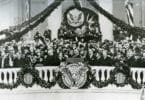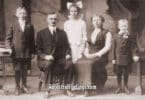As we continue our Pillars of Power series, we turn to Richard Nixon—a president remembered for diplomatic achievements and one of the most infamous scandals in American history. Born into modest circumstances, Nixon’s resilience and drive were forged by his family’s deep Quaker faith, a legacy of hardship, and an unyielding commitment to public service. This article explores Nixon’s genealogy, beliefs, and the forces that molded him into a leader marked by both historic achievements and profound challenges.
Family Background: Nixon’s Quaker Roots
Richard Milhous Nixon was born on January 9, 1913, in Yorba Linda, California, into a deeply religious family of Quaker descent. His father, Francis A. Nixon, ran a small lemon farm and later owned a grocery store and gas station. Francis’s hard-working yet often stern character had a lasting influence on young Richard, instilling a sense of duty and perseverance.
Nixon’s mother, Hannah Milhous Nixon, was a devout Quaker with roots tracing back to English and Irish ancestors who settled in Pennsylvania in the 1600s. The Milhous family had a long history of religious devotion and service, and Hannah’s strong faith was a cornerstone of Nixon’s upbringing. She was described as gentle, compassionate, and deeply moral—qualities that Nixon admired but sometimes found hard to emulate given his more pragmatic, competitive nature.
Growing up in a Quaker household, Nixon was taught values such as humility, simplicity, and pacifism. However, his relationship with these beliefs was complicated. While he admired his mother’s quiet strength and took pride in his Quaker heritage, he sometimes struggled with the strict moral and ethical codes associated with Quakerism, especially as he entered the competitive world of politics.
The Milhous Family Legacy
The Milhous side of Nixon’s family was particularly influential in shaping his worldview. The Milhouses were among the early settlers of Pennsylvania, establishing themselves as prominent members of the Quaker community. This heritage gave Nixon a sense of pride in his ancestry, but it also presented high expectations to uphold the values of integrity and service. Nixon often cited his mother’s teachings, shaped by her Milhous heritage, as a moral guide throughout his life, even as he navigated the ethical complexities of public office.
Hannah Nixon’s unwavering pacifism, a central tenet of her Quaker beliefs, created an interesting tension for Nixon, particularly as he rose through the political ranks. Although Nixon respected his mother’s values, he recognized the realities of international conflict and became known for his assertive foreign policy stance, often finding himself at odds with Quaker ideals of non-violence and diplomacy. This contrast between his family’s pacifist beliefs and his political pragmatism would become a recurring theme in his career.
Nixon’s Faith and Core Beliefs
Nixon’s Quaker upbringing had a lasting influence on his character, shaping his beliefs on duty, resilience, and hard work. From an early age, he was instilled with a strong sense of individual responsibility—a value he carried throughout his political career. While Nixon was not publicly vocal about his faith, he often referred to his upbringing and his mother’s influence as guiding forces, especially in difficult times.
Nixon’s beliefs emphasized pragmatism over ideology. He valued efficiency, order, and results, which sometimes put him at odds with the idealism of his Quaker roots. Despite this, he saw himself as a servant of the people, often working long hours and adopting a rigorous approach to problem-solving. His dedication to service and his drive to succeed stemmed in part from his desire to honor his family’s legacy of resilience, which had seen them through financial hardship and personal loss.
The Impact of Personal Hardships
Nixon’s early life was marked by challenges that shaped his resilience and determination. Two of his brothers, Arthur and Harold, died young, and their deaths deeply affected Nixon and his family. These tragedies reinforced his commitment to hard work and his belief in overcoming obstacles. His brother Harold’s death, in particular, pushed him toward public service, as he felt a duty to honor his family’s sacrifices.
These personal losses also deepened Nixon’s sense of isolation—a trait that would define much of his life and career. He developed a fierce independence and an “us versus them” mentality, feeling he had to work harder than others to earn his place. This mindset contributed to his intense competitiveness and, some might argue, a tendency toward secrecy and distrust, which would later impact his presidency.
Beliefs in Foreign Policy and the Concept of Peace Through Strength
Nixon’s approach to foreign policy reflected a nuanced balance between his pragmatic beliefs and his family’s Quaker values. Although he was raised in a pacifist tradition, Nixon believed strongly in “peace through strength”—the idea that a powerful America could deter war and promote stability. This philosophy guided his approach to the Cold War, leading to his policy of détente and his historic 1972 visit to China, which opened diplomatic relations between the two countries.
Nixon’s belief in strength and resilience led him to pursue arms control negotiations with the Soviet Union, resulting in the Strategic Arms Limitation Talks (SALT) and the Anti-Ballistic Missile Treaty. These agreements represented his belief in diplomacy backed by strength, a concept that diverged from his Quaker roots but aligned with his pragmatic worldview. Nixon saw these efforts as a way to prevent the horrors of war, viewing strength not as aggression but as a form of protection.
Legacy: A Complex Figure Shaped by Faith and Family
Richard Nixon’s life and beliefs were deeply rooted in his family’s history, Quaker faith, and personal hardships. His parents’ values of hard work, service, and integrity influenced his dedication to public life, even as he sometimes struggled to reconcile these ideals with the realities of politics. Nixon’s duality—his respect for his Quaker heritage and his commitment to political pragmatism—created an internal conflict that defined much of his career.
Though Nixon’s presidency is often overshadowed by the Watergate scandal, his legacy includes groundbreaking achievements in foreign policy and social reform. His efforts in opening relations with China, pursuing arms control with the Soviet Union, and expanding social programs like the Environmental Protection Agency reveal a leader driven by a complex mix of beliefs rooted in family, faith, and resilience.
Nixon remains one of America’s most polarizing figures, a president shaped by the push and pull of inherited values and personal convictions. His story reminds us that leaders are often guided by deeply personal beliefs and experiences—forces that shape their actions and ultimately, their legacies.
To gain a deeper understanding of Richard Nixon’s life, beliefs, and the influences that shaped his presidency, consider the following insightful books:
RN: The Memoirs of Richard Nixon
In this autobiography, Richard Nixon provides a personal account of his life, from his early years to his presidency and beyond. He reflects on his family background, personal beliefs, and the events that defined his political career, offering readers an intimate perspective on his experiences and decisions.
Nixonland: The Rise of a President and the Fracturing of America
Authored by Rick Perlstein, this book delves into the cultural and political climate of America during Nixon’s rise to power. It explores how his personal beliefs and strategies influenced the nation’s divisions and the lasting impact of his leadership on American society.
Written by Evan Thomas, this biography offers a nuanced portrayal of Nixon’s complex personality. It examines the internal conflicts between his Quaker upbringing, personal convictions, and political ambitions, providing insight into the man behind the public persona.
John A. Farrell presents a comprehensive biography that traces Nixon’s journey from his modest beginnings to the presidency. The book explores how his family heritage and personal beliefs influenced his policies and political strategies, shedding light on the complexities of his character.
The Arrogance of Power: The Secret World of Richard Nixon
Anthony Summers provides an investigative look into Nixon’s life, focusing on the dichotomy between his public image and private beliefs. The book uncovers aspects of his personality and decision-making processes, offering a critical perspective on his leadership and legacy.






